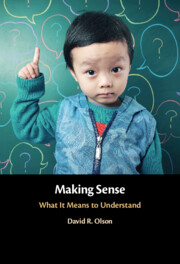Book contents
- Making Sense
- Making Sense
- Copyright page
- Dedication
- Contents
- Figures
- Tables
- Preface
- 1 An Introduction to the Puzzles of Understanding
- 2 Understanding As Feeling and As a Concept
- 3 The Linguistic Basis of Mind
- 4 Subjective Mental States
- 5 Objective Mental States
- 6 Intersubjectivity of Mental States
- 7 Identity Conditions for Feelings and Concepts
- 8 What “Understanding” Means
- 9 The Referential Scope of Understanding
- 10 Understanding and Children’s Theory of Mind
- 11 Understanding and Sense-Making
- 12 Understanding As a Learnable Skill
- 13 Understanding in Everyday Life
- 14 Ascriptivism and Cognitive Development
- References
- Index
4 - Subjective Mental States
The Feeling of Understanding
Published online by Cambridge University Press: 21 April 2022
- Making Sense
- Making Sense
- Copyright page
- Dedication
- Contents
- Figures
- Tables
- Preface
- 1 An Introduction to the Puzzles of Understanding
- 2 Understanding As Feeling and As a Concept
- 3 The Linguistic Basis of Mind
- 4 Subjective Mental States
- 5 Objective Mental States
- 6 Intersubjectivity of Mental States
- 7 Identity Conditions for Feelings and Concepts
- 8 What “Understanding” Means
- 9 The Referential Scope of Understanding
- 10 Understanding and Children’s Theory of Mind
- 11 Understanding and Sense-Making
- 12 Understanding As a Learnable Skill
- 13 Understanding in Everyday Life
- 14 Ascriptivism and Cognitive Development
- References
- Index
Summary
Whitman, of course, was the evangelist for first-person subjective experience. In Chapter 3, I argued that understanding should be seen as including a subjective feeling, an emotion, and an objective achievement. Feelings and emotions are characterized as having such properties as valence, strength, and “content.” That content is conferred by an appraisal of the current situation in the light of prior experience; thus, different appraisals evoke different feelings. I will refer to the content of a feeling state as an intuition with “identity conditions” that may be quite different from those for concepts and beliefs.
- Type
- Chapter
- Information
- Making SenseWhat It Means to Understand, pp. 40 - 55Publisher: Cambridge University PressPrint publication year: 2022

